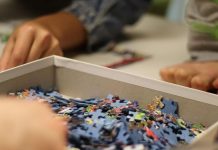In Kangalitai village in Turkana county, a traditional dance welcomes every day’s activity.
But today the villagers are not holding the traditional herding sticks that usually accompany the dance.
Instead, they have farming tools like mattocks, spades and pangas – ready for them to start work when the dance ends.
This is a huge cultural shift and one – the tribes say – is a shock of a lifetime.
At this time of the year Lokale Ekitowou would usually be somewhere between the plains of Turkana and West Pokot, herding his cattle.
But today he is weeding on his farm and soon his maize crop will be ready for harvest.
This means Ekitowou will remain in this village for at least six months, disrupting his traditional nomadic cycle.
“Due to drought in our traditional grazelands, we went to encroach on a neighboring village. They chased us in a gunfire exchange where we lost all the cattle and all my friends were killed by the bullets,” he explains.
“So I decided to come back home where I found crop farming had already taken traction. I decided to join crop farming because the weather was no longer promising us grass, and the short rains could sustain some crops in my area.”
Just a few paces from Ekitowou’s farm, Napem Erusenyat is weeding. Her daughter, whose role would traditionally be to look after goat kids, is scaring away birds from their sorghum (great millet) farm.
“In the recent past, we have been experiencing unpredictable rain patterns,” she explains.
“Because we used to depend on nomadic pastoralism, we went to a village where we were chased because grazing land wasn’t enough. When we came back to our village, we decided to have our chairman consult crop farming experts to help us to start crop farming. We now have maize and sorghum.”
Ekitowou’s daughter may never experience the miles her parents used to walk and cycle every year as nomadic pastoralists. She is now being taught to farm crops.
Over in Kajiado County, pastoralist Maiyani Melonye tends to his cattle.
He was raised between the plains of Maasai Mara and the hills of Oldonyo-Sabuk, an expanse divided by more than 300 kilometres of Savanna grassland.
Melonye believes he is the last of his generation to live the life of a traditional Maasai nomad.
“In a year, I could go in a complete circle. I would pass through Makindu, through Voi, Namanga into Tanzania, to Olonkito, Orendenge, all-round and back home. That time it would have rained here again and the circle would begin. I don’t think our children will know that nomadic tradition. It is over,” he says.
“From the way the weather has become unpredictable, our children will never be like us, the way we were brought up on how to locate grazing lands. They will only know the language but never understand the Maasai traditions.”
Mercy Corps is a humanitarian aid organization that is helping vulnerable communities to adapt during these changing times.
Hussein Noor, Chief of Party at Mercy Corps, says climate change has made the end of traditional nomadic farming inevitable.
“With climate change, I think this could be the beginning of the end of African pastoralism as we have known over the years.”
“Because we can no longer rely on the traditional rainfall systems, we can no longer rely on traditional weather forecasts, and the more erratic the rainfall is the more fragile the system becomes, the more products that is getting less, both either livestock or land, then over the years I think we could be losing the traditional African systems as we know it today,” he says.
The organization is calling on governments and concerned parties to help preserve the traditional nomadic culture rather than allowing changing climates to erode it.
It wants to establish protected traditional grazelands that would help guard nomadic pastoralists against encroachers that erect uncontrolled permanent settlements.
“It is not as easy as many people think. The mindset is one of pastoralism, is one of moving from one area to another and we have to appreciate that. What we need to think about is how do we make that lifestyle more functional in the face of climate change as opposed to looking for alternatives that will actually bring more shock to them than actually becoming part of the solution,” says Noor.
The fate of a centuries-old Maasai tradition lies in the balance – and for many, that means much more than simply adapting farming methods.
“I think nomadism represents who we are. It is an identity, it’s a culture that we really need to make sure that it exists for future generations as well. And for me if we really don’t preserve that culture, we don’t preserve that nomadism, for me that is the end of a culture with the identity of pastoralism as we have known it as well,” says Noor.














